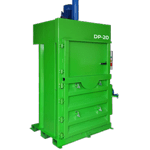
Instead of "waste" we need you to see a tangible asset, a commodity with a market value. When your recyclables are baled and stored properly, this will not only save space and time, but it will also turn your waste into a source of income!

COMING SOON
FOLLOW US
© 2025 DownWaste